Learning Modules
Module 05
Hong Kong government’s support in vaccine promotion
01. Anti-epidemic measures
(1) Reasonable control on social distancing to provide optimal convenience for returning to normal life
The epidemic situation in Hong Kong changed rapidly in early January 2022 and the Government tightened its social distance measures on 7 January [1].
Later on, the Government made timely adjustments of the measures in response to the development of the epidemic and a reasonable control on social distancing have been implemented to contain the spread of the epidemic and provide optimal convenience for returning to normal life. From 17 November 2022 onwards, further relaxation of the social distancing measures have been taken place to allow members of the public to continue to return to normal life in an orderly manner. [2]
On 30 January 2023, the Government adjusted the anti-epidemic measures again, which included removing definition of close contacts and ceasing issuance of quarantine orders [3]. For updated information, please go to news.gov.hk
(2) Timely changes to immigration policy
The “3+4” quarantine arrangement implemented from 12 August 2022 onwards for arrivals (from overseas and Taipei) to Hong Kong was relaxed [4]. The new "0+3 measure came into effect on 26 September 2022. People arriving in Hong Kong from overseas places or Taipei were required to undergo a three-day medical surveillance plus regular virus tests [5]. Responding to the latest development of COVID-19 epidemic, the Government announced on 3 February 2023 that normal travel between Hong Kong and the Mainland would fully resume from February 6 and all pre-trip testing requirements between the two places would be lifted [6]. For updated information, please go to news.gov.hk
(3) The Government set up community testing centers
For free testing and made timely adjustments to the locations and staffing of the centers according to the actual testing needs of the citizens. For updated information, please go to news.gov.hk
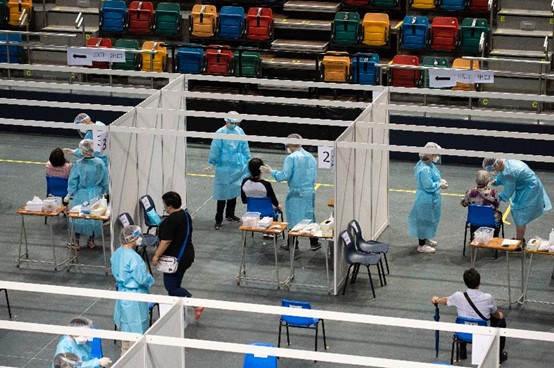
(Acknowledgement from Hong Kong Special Administrative Region (HKSAR) Government)
(4) Measures for hospital visits and consultations
In response to the epidemic, the Hospital Authority has reduced non-emergency and non-essential services to protect in-patients and the public [7]. However, compassionate visiting arrangements have been provided to meet the public demand. Speaking at a press conference, Dr CHUANG Shuk-kwan, Head of the Communicable Disease Branch, the Centre for Health Protection of the Department of Health, said that compassionate visiting arrangements had always been in place to assist people from outside the territory arrived to Hong Kong to visit whose family members who are in an emergency condition [8].
(5) Publicity and Education
The Government produced various publicity videos, pamphlets, etc., targeting people of different age groups to promote and educate them about pneumococcal infection and the importance of vaccination, and personal care [33].
(6) Influenza and Pneumococcal Vaccination Subsidy Scheme
The Vaccination Subsidy Scheme (VSS) is a programme that provides subsidized influenza and pneumococcal vaccinations to eligible Hong Kong residents through the participation of private medical practitioners. Participating doctors provide vaccinations to eligible persons and the Government provides a vaccination subsidy to the doctors. The doctors may charge eligible persons additional fees, after deducting the subsidy.
The 2023/24 Influenza Vaccination Subsidy Scheme commenced on 28 September. The Government Vaccination Programme, Seasonal Influenza Vaccination School Outreach (Free of Charge) Programme and Residential Care Home Vaccination Programme commenced on 5 October [34].
02. Input of medical resources
(1) Adjusting the ratio of hospital beds and health care personnel to ensure to provide sufficient manpower for treating COVID-19 patients.
The Government has been actively coordinating with different sectors to alleviate the pressure on the public healthcare system, including requesting private hospitals to assist in receiving non-COVID-19 patients from the Hospital Authority, and inviting various healthcare professional bodies, tertiary healthcare institutions, medical organizations, medical institutions and NGOs to provide medical support [9].
For example, 11 March 2022, the Tung Wah Group of Hospitals Fung Yiu King Hospital pooled together about 260 beds to receive COVID-19 patients. This arrangement allowed focusing of manpower and resources for caring of COVID-19 patients at the time when the epidemic was severe [10].
(2) Disinfection in public places, mask-wearing, and distribution of supplies
Since the outbreak of the COVID epidemic, the Housing Department has been stepping up hygiene and cleansing measures in its public housing estates [11].
From 2 to 8 April 2022, anti-epidemic service bags were distributed to all households in public housing estates. The service bags have disease prevention information, rapid antigen test kits, KN95 masks and proprietary Chinese medicines [11].
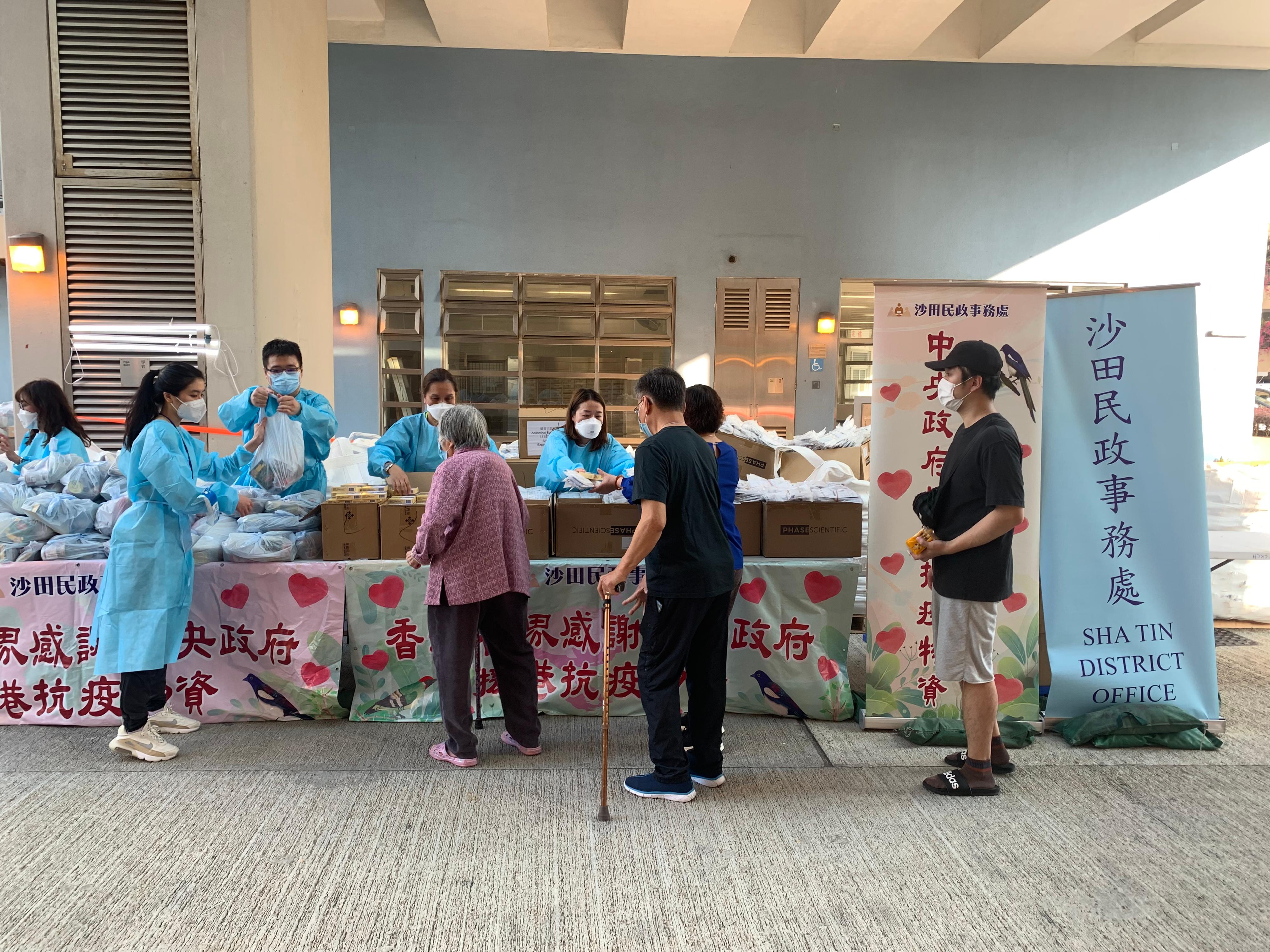
(Acknowledgement from Hong Kong Special Administrative Region (HKSAR) Government) [35]
Staff members of the Hong Kong Housing Authority and government officials visited households of older adults and distributed the anti-epidemic service bags. Efforts have been strengthened to support older adults during the epidemic, such as proactively contacting older adults for delivery of care and assistance [11].
(3) The Government actively promoted vaccination and set up more vaccination centers to provide free vaccination [12]
Vaccination centers were set up by the Government at places with a high flow of people and convenient transportation. In addition, the number of Private Clinic COVID-19 Vaccination Stations was increased to 26. The above arrangements made the daily vaccination capacity reach about 63, 000 doses, which was much higher than the current vaccination demand [13]. For updated information, please go to news.gov.hk
The Government also launched the territory-wide Home Vaccination Service for people with special needs, such as older adults, or persons with impaired mobility due to illness or disability [15].
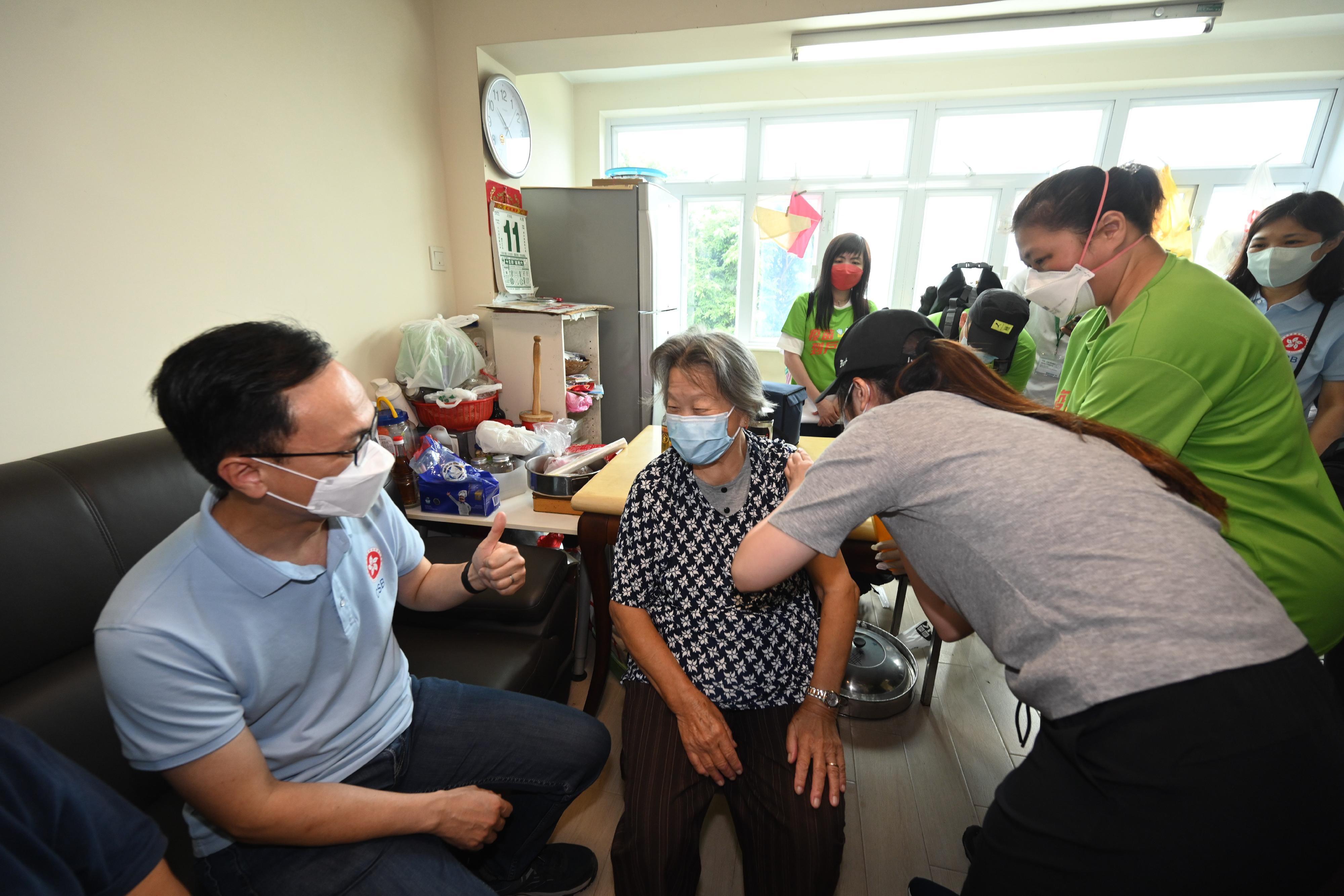
(Acknowledgement from Hong Kong Special Administrative Region (HKSAR) Government)[36]
(4) Encourage higher education institutions to carry out COVID-19 related research
On 27 April 2020, the Health and Medical Research Fund (HMRF) of the Food and Health Bureau approved a total grant of $111 million to support the medical schools of the University of Hong Kong and the Chinese University of Hong Kong to conduct 26 medical research projects on the novel coronavirus disease. [15]
25 February 2020, The Hong Kong Polytechnic University and the Hospital Authority announced collaborative designing and producing 3D-printed face shields [16].
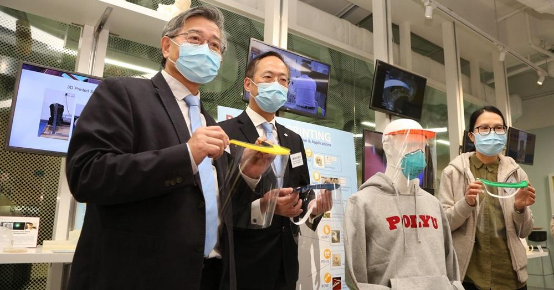
(Photo source: the website of The Hong Kong Polytechnic University) [17]
From April 2020 onwards, the Health and Medical Research Fund (HMRF) of the Health Bureau has approved a total of $29.5 million for vaccine development. Among the funded projects is a collaboration between the Department of Microbiology of the Faculty of Medicine of the University of Hong Kong, Xiamen University and Beijing Wantai Biological Pharmacy Enterprise Co Ltd to develop VectorFlu ONE, a COVID-19 nasal vaccine [18].
(5) Use social media to update information on COVID-19
In January 2020, the Government set up a COVID-19 thematic website 'Together, We Fight the Virus' to provide information and health [19].In addition, the Government has launched the Hong Kong Anti-epidemic Information Channel on Facebook pages of its departments, to disseminate Government’s information on the Coronavirus Disease 2019 to the public in a fast and direct manner [20].
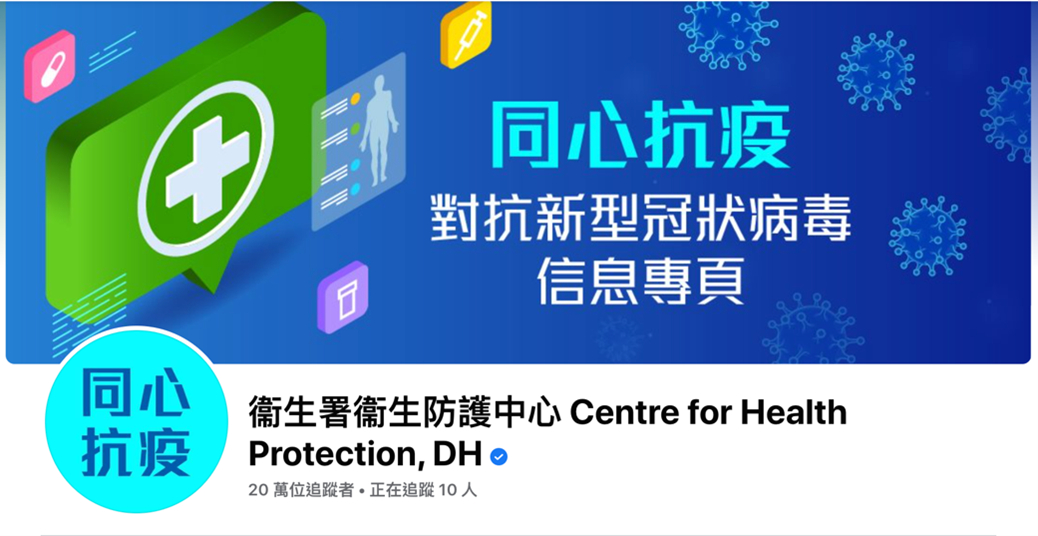
Click here to visit the Facebook page of the Centre for Health Protection, the Department of Health.
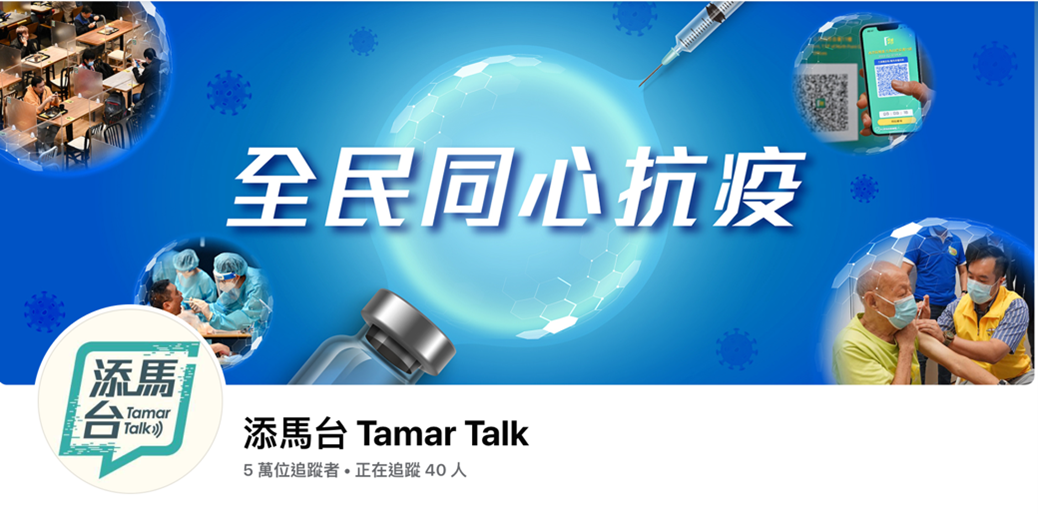
Click here to visit the Tamar Talk Facebook page.
(6) The Government sought help from the Central Government for supporting Hong Kong to fight against the epidemic
The Government requested the Central Government to send Chinese medicine experts to help Hong Kong in fighting against the epidemic.
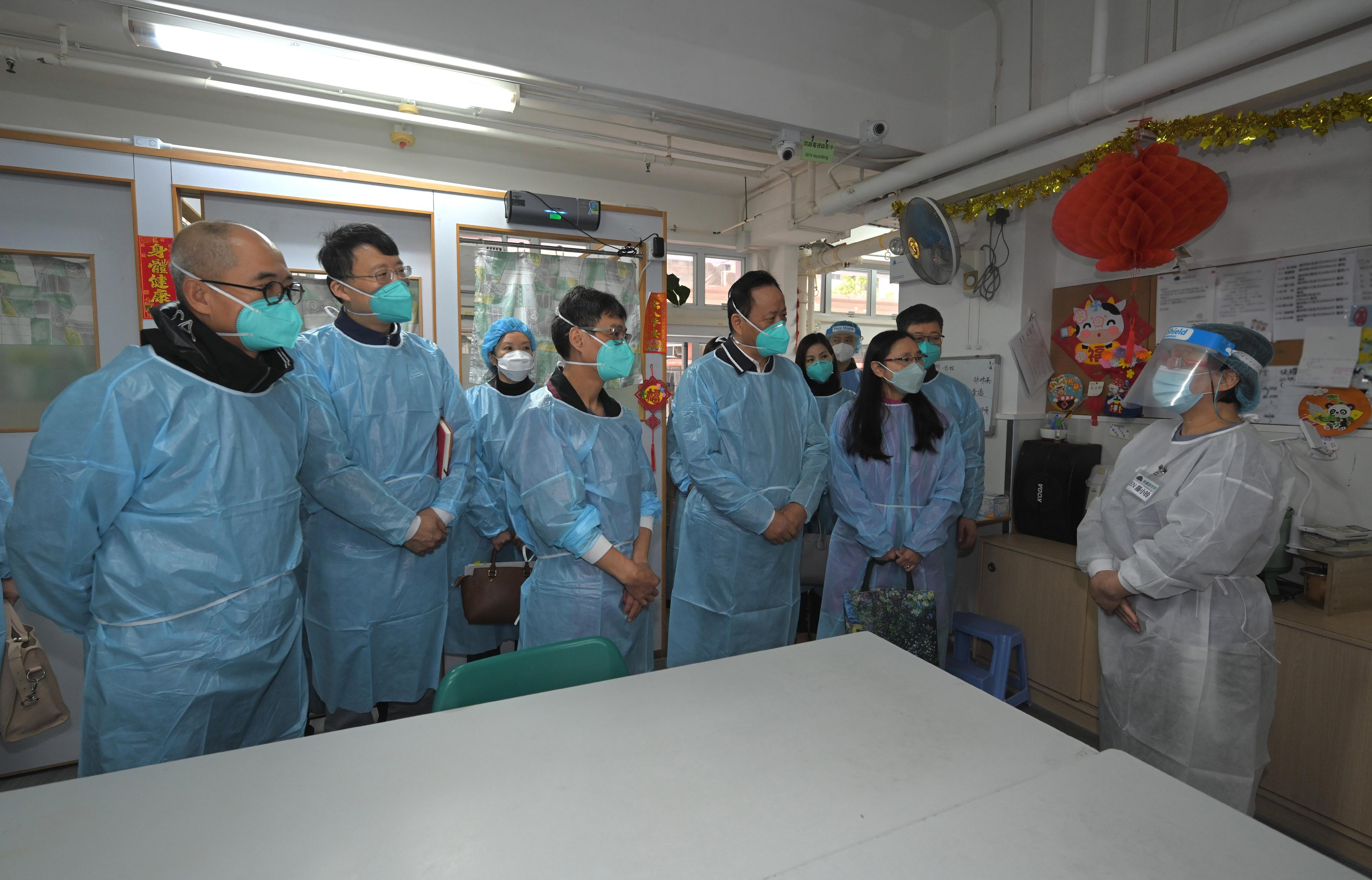
(Acknowledgement from Hong Kong Special Administrative Region (HKSAR) Government)
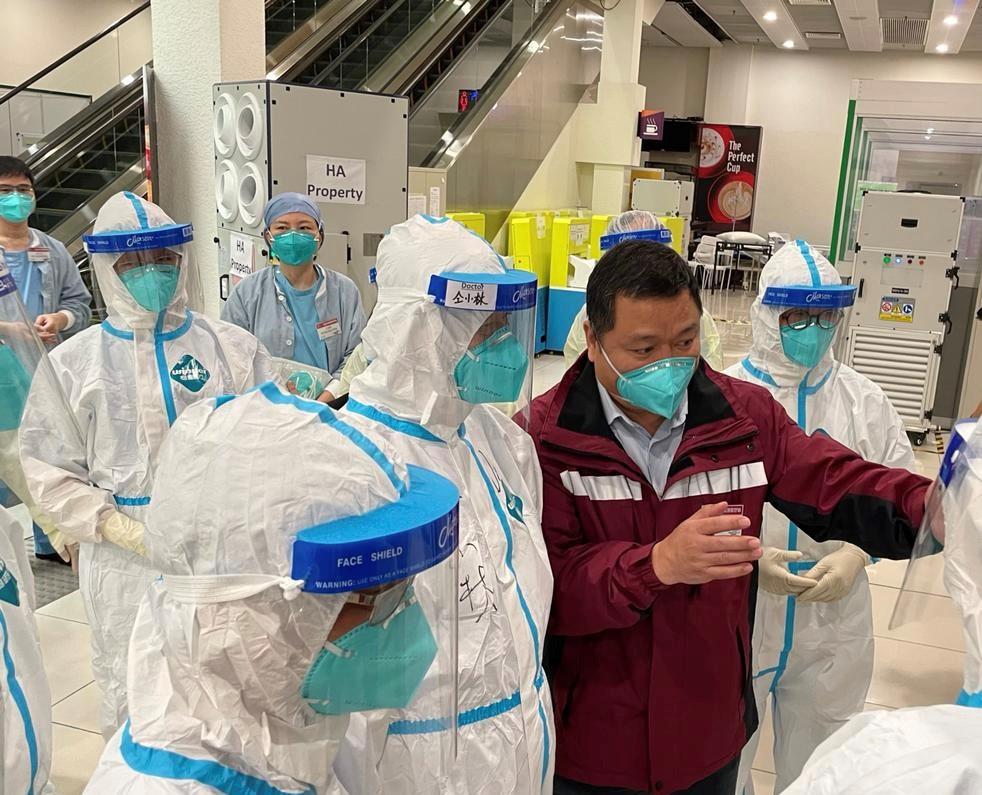
(Acknowledgement from Hong Kong Special Administrative Region (HKSAR) Government)
03. Financial and other assistance
(1) The Government set up the Anti-epidemic Fund and formulated measures to relieve financial burdens of individuals and businesses.
The Government injected $ 30 billion to the fund and launched a total of six rounds of the Anti-epidemic Fund.
For the disadvantaged groups, the Government provided a one-off special allowance through the Fund to eligible Working Family Allowance (WFA) households and means-tested Student [including pre-school, primary and secondary school children] Financial.
Assistance (SFA) households. To alleviate the burden of parents, the Government provided a grant of $3,500 to each student receiving a student allowance in the 2019-20 school year through the Fund. [21]
(2) Subsidies and assistance for the general public
2.1 Consumption Voucher Scheme 2021 and 2022
In July 2021, the Government launched a $5,000 e-vouchers [22].
In 2022, the Government launched the $10,000 e-vouchers to relieve the financial pressure of the general public caused by the fifth wave of the epidemic [23].
2.2 Public Transport Subsidy Scheme
A temporary special measure of the Public Transport Fare Subsidy Scheme was introduced earlier and it lasted until 30 April 2023. To allow more people to benefit from the scheme during the epidemic, the Government announced to continue to subsidise amounting to one-third of the actual public transport expenses in excess of $200, subject to a maximum of $500 per month for each Octopus [24].
2.3 Electricity Subsidy Scheme
In the 2022-23 Budget, the Financial Secretary announced a series of one-off relief measures to alleviate the economic pressure of the public caused by the epidemic, including an electricity charges subsidy of $1,000 for each eligible residential electricity account (“the new subsidy scheme”) [25].
2.4 Tax concessions
A one-off reduction of profits tax, salaries tax and tax under personal assessment for the year of assessment 2021/22, by 100 per cent, subject to a ceiling of $10,000 per case [26].
(3) Providing unemployment assistance
To relieve the unemployment situation caused by the epidemic and anti-epidemic measures, the Government earmarked $13.2 billion under the Anti-Epidemic Fund to implement the Job Creation Scheme to create time-limited jobs in the public and private sectors [27].
In addition, the Government announced on February 8 the launch of Temporary Unemployment Relief Scheme under the sixth round of the Anti-epidemic Fund, which provided a one-off subsidy of $10,000 to people who had lost their jobs (including full time, part-time or self-employed) persons due to the fifth wave of the COVID-19 epidemic [28].
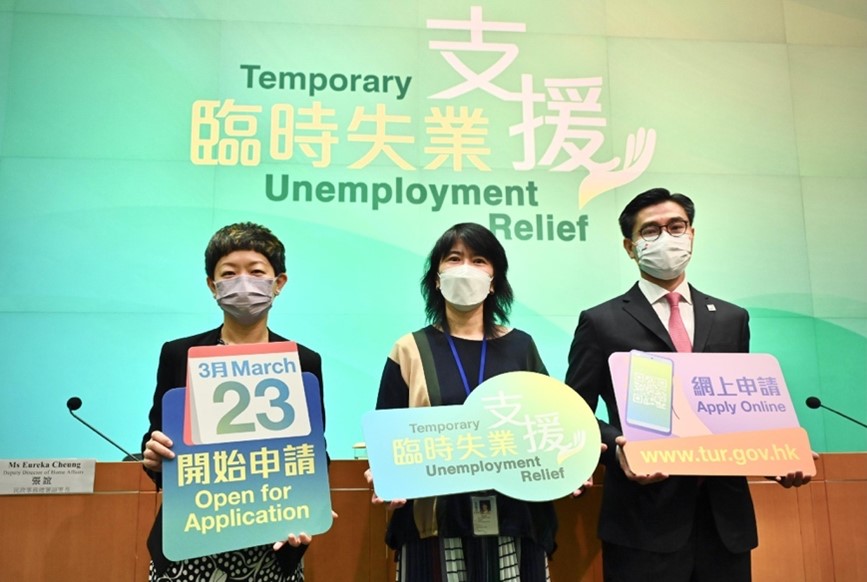
(4) Hotlines for psychological support
The Family Health Service of the Department of Health provided psychological counseling services to COVID patients and their carers. Other hotlines included the Mental Health Hotlines operated by the Social Welfare Department and the Hospital Authority and the "Shall We Talk" psychological support hotline service run by Hong Kong Red Cross [29].
(5) Reaching out and helping Hong Kong people outside of Hong Kong
On 17 February 2020, the Government arranged two chartered flights to Japan to bring home 350 Hong Kong residents quarantined for the novel coronavirus on the Diamond Princess cruise ship [30].
(6) Insurance coverage
From 15 March 2020 onwards, the voluntary health insurance policy has covered the novel coronavirus disease. If an insured person is infected or suspected to be infected with the virus after the voluntary health insurance policy has been in force, the hospitalization expenses will be covered in accordance with the terms and conditions of the approved product. [31]
On 18 February 2021, the Government set up the Indemnity Fund for Adverse Events Following Immunization with Coronavirus Disease-2019 Vaccines, with an initial allocation of $1 billion to the fund. Eligible individuals who have suffered unexpected serious adverse events associated with a COVID-19 vaccine can file a claim in two years following the vaccination. [32]
(7) Seasonal Influenza Vaccination Subsidy Scheme
The Government offers a number of influenza vaccination programmes. Click here to learn more.
-
The Government Vaccination Programme
- The Government Vaccination Programme provides free influenza vaccination to eligible groups.
-
Residential Care Home Vaccination Programme
- Provides free influenza vaccination to designated residential care homes.
-
Vaccination Subsidy Scheme - General public
- Provides subsidized influenza pneumococcal vaccinations to the eligible groups
-
Seasonal Influenza Vaccination School Outreach (Free of Charge) Programme
- Provides influenza vaccination to school children and eligible persons
(8) Pneumococcal Vaccination Subsidy Scheme
-
Under the Vaccination Subsidy Scheme in 2023/24, the subsidy rate is $400 per dose of 23-valent Pneumococcal Polysaccharide Vaccine and $800 per dose of 13-valent Pneumococcal Conjugate Vaccine.
All Hong Kong residents aged 65 or above (count by year of birth) are eligible to receive the Government subsidy. Healthcare professionals can give advice to older adults on the need for pneumococcal vaccination and the type of vaccine to be given, taking into account whether they are at high risk and had received pneumococcal vaccination before.
People not belonging to the eligible groups but are advised to receive the vaccine can consult their family doctors and/or consider whether they should get vaccinated at their own expense for personal protection.
- All eligible persons who receive their seasonal influenza vaccines at enrolled private doctors' clinics or outreach venues will receive a subsidy of $260 per dose. Children under the age of 9 who have never received any seasonal influenza vaccines will be subsidized for receiving two doses of the vaccine.
- The Government will continue to provide subsidy for seasonal influenza vaccination to the following eligible groups (Hong Kong residents): pregnant women, persons aged 50 years or above, children aged 6 months to under 18, persons with intellectual disability, persons receiving Disability Allowance; persons who are recipients of standard rate of "100% disabled" or "requiring constant attendance" under Comprehensive Social Security Assistance (CSSA) Scheme of the Social Welfare Department. If you are not belonging to the above eligible groups but are advised to receive the vaccine, please consult your family doctor and consider whether you should get vaccinated at your own expense for personal protection [40].



